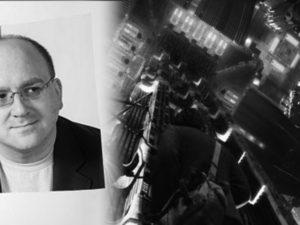
By Foz Meadows
When I was growing up, my parents worked with words: my mother as an editor and my father as a critic. Between the two of them, I was routinely exposed to rants about technical writing, editorial bias, colloquialism vs bad grammar, the Oxford comma, and the difference between summarising a thing and reviewing it. This last was a routine source of annoyance to my father, whose “reviews” for our local paper didn’t always contain his actual opinions. Even if he hadn’t been able to see a particular film or play, he was still called upon to produce a summary of the plot based on the press release, and it irked him whenever one of these factual synopses was conflated with actual criticism.
Often, he was given opening night tickets to plays and movies, and if he thought I’d enjoy the show, he’d bring me as his plus one. It was through these auspices that I published my first ever piece of professional criticism, aged eleven: he took me to see the stage adaptation of Victor Kelleher’s Del Del, a YA psychological thriller with SFF elements, and my subsequent review of it formed the bulk of his column. The attribution was bungled a little, thanks to a copywriter who saw my age and assumed my dad was responsible for all but the opening sentence, but it was still exciting to see something I’d written set down in physical newsprint, as was still the norm in 1997. My parents have a copy of it somewhere, tucked away in one of the endless manila folders my father keeps in his study, and while I haven’t seen it in years, it’s nice to know it’s there: an artifact of my fledgling critical process.
Nobody who’s met me as an adult would be shocked to learn that I was an opinionated kid, but as natively mouthy as I am, my foundational concepts of questioning, criticism, and literary engagement were informed by my parents’ professions. Once I was old enough to take an interest in politics and the news, we’d sit down to the evening’s Media Watch as a family, my parents alternately cackling with laughter or tsking in reprimand during the show, and then afterwards telling anecdotes about their own time as reporters.
I didn’t realise it at the time, but much of what I learned on those nights has since proved to be of more and greater importance to my adult life than any number of things I was taught in school. The fact that my parents were both former ABC journalists with a great deal of affection for the broadcaster didn’t stop them from criticising it – or from cheering Media Watch’s criticism – when they did something foolish, just as disdain for other outlets didn’t stop them acknowledging a story well-reported. Long before I ever knew what a dogwhistle was, I’d listen to my father decry the rise of editorialising in the media – journalists using loaded terms to steer the audience towards a desired conclusion while feigning impartiality – and how the practice served to obscure the vital distinction between facts and opinions. Likewise, I learned precision of language from my mother: whether the slip was intentional or not, she’d always end up muttering if a word was misused in a way that obscured meaning.
All that being so, it’s hardly surprising that I fell into writing criticism for fun. In the early days of the public Internet, when 56k modems were a Big Deal and Google was yet to conquer Ask Jeeves and Yahoo, I’d post mini essays and book reviews for my own enjoyment, debating with other writers in poetry and SFF forums about the merits of this piece or that, all the while fumbling my way to a better critical consciousness. I don’t now remember when or where I started my first proper blog, but for a geeky kid with more opinions about fantasy novels than she had people willing to play audience, the Internet was the perfect place to put them.
My Shattersnipe blog turns ten years old in May this year, which is a genuinely startling milestone to contemplate. The idea of my one day being invited to participate in something like the Shadow Clarke jury wouldn’t have occurred to me a decade ago. Though my first novel was years from being accepted and published when I started Shattersnipe, my aim was still to become a fantasy author, which is why I opted to blog under my own name. Even so, I had no sense that I might end up being paid or known for my essays there: it was just an extension of what I’d always done, a way to keep myself occupied. I’ve changed a lot since I started it, as has my writing; as, for that matter, have my opinions about writing. My taste in things has never been static, and while there’s something to be said for consistency, it’s my belief that critical practice, like any other discipline, should always be a sort of Theseus’s ship, willing and able to improve or change while still remaining coherent and functional.
At base, my approach to criticism is that total objectivity is impossible. Everyone has a bias, which is another way of saying that everyone has their own tastes, opinions, and context, and that rather than trying to feign objectivity by generalising those biases into an inherently limited concept of what is Normal or Traditional and therefore Good, the more honest, productive approach is to acknowledge them openly. In this way, I believe, our literary yardsticks become both more varied in terms of scope and more individually useful to the audience. Knowing that a critic dislikes steampunk, for example, gives their potential enthusiasm for a steampunk novel far more positive weight than if that dislike had hitherto been presented, not as an individual preference, but as a blanket, universalised declaration that steampunk is fundamentally Bad. In the latter case, such a critic’s praise of a book that their readership would reasonably have expected them to shun reads as a total alteration of judgement and worldview, like a political flip-flop, and is therefore made somewhat suspect. In the former case, it becomes a genuinely intriguing recommendation, that such a story was good enough to overcome their usual inclinations.
As a Shadow Clarke juror, my aim will be to acknowledge my tastes and biases in a way that renders my judgement more useful to the reader than if I’d concealed them. Though I have a habit of expressing my opinions strongly, whatever they might be – and while I’m occasionally prone to dissecting a beloved narrative with greater vehemence than I might a mediocre one – my tastes are ultimately varied. In this spirit, I’m looking forward immensely to engaging with my fellow jurors, and to seeing what this year’s Clarke Award will bring.
*
Foz Meadows is a genderqueer fantasy author, essayist, reviewer, blogger and poet. She has most recently published An Accident of Stars, A Tyranny of Queens with Angry Robot, and Coral Bones with Rebellion. Foz is a reviewer for Strange Horizons, a contributing writer for The Huffington Post and Black Gate, and a repeat contributor to the podcast Geek Girl Riot. Her essays have appeared in various venues online, including The Mary Sue, A Dribble Of Ink and The Book Smugglers. She is a two-time Hugo Award nominee for Best Fan Writer in 2014 and 2017, and won the 2017 Ditmar Award for Best Fan Writer, having also been nominated in 2014 and 2016. In 2017, An Accident of Stars was a finalist for the Bisexual Book Awards.
3 Comments
-
> and while I’m occasionally prone to dissecting a beloved narrative with greater vehemence than I might a mediocre one
Don’t we all 😀I’m really pleased to see you on the Shadow Jury; you write excellent criticism I’ve enjoyed often, and I look forward to seeing you dig into a whole bunch of current books. Enjoy!
-
Haha, thank you! 😀
-
Pingbacks
-
[…] (14) MEET ANOTHER SHARKE. Another new Shadow Clarke juror meets the publilc: “Introducing Foz Meadows”. […]


